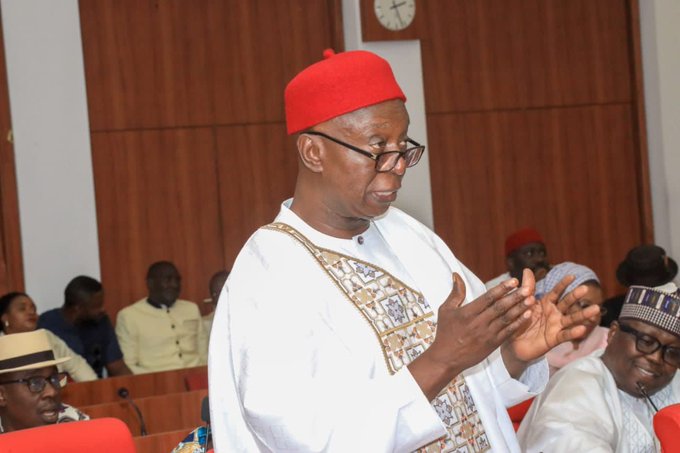Senator Nwoko averred that oil theft in Nigeria thrives owing to alleged collaboration between security forces, militia groups, locals, and certain employees of oil companies, who employ sophisticated methods to steal oil from facilities.

Worried about incessant acts of crude oil theft in the Niger Delta region, and its effects on the nation’s economy the Senate has called for a holistic investigation into sophisticated methods employed by crude oil thieves in their operations.
The call followed the adoption of a motion on the “Urgent Need to Investigate the Incessant and Nefarious Acts of Crude Oil Thefts in the Niger Delta and the Actors”, co-sponsored by Senator Ned Munir Nwoko (APC, Delta North), Senator Ede Dafinone Omueya (APC, Delta Central) and Senator Joel Onowakpa Thomas (APC, Delta South) on Tuesday during plenary.
In his lead debate, Senator Nwoko noted Nigeria’s dependency on crude oil for its economic growth and development and highlighted its significant role in providing employment opportunities for millions of Nigerian citizens.
He also noted that the National Bureau of Statistics reported the oil sector contributed 6.33% of the Nation’s GDP which translates to $45.6 billion in 2022.
“The oil sector in Nigeria plays a pivotal role in providing employment opportunities for millions of Nigerian citizens and accounts for 70% of its budget financing while oil and gas made up 90% of export income and 85% of Government revenue in the first quarter of 2022.”
READ ALSO: Deforestation: Reps beam searchlight on foreign timber loggers
The lawmaker recalled how crude oil thefts began during the military regime from the late 1970s and early 1980s causing socio-economic crises in the country for several years.
“Statistical data which has been reported over the years even till date, have shown that pipeline vandalism, oil bunkering, has brought Nigeria into serious socio-economic crisis, and this remains an intractable challenge to the Nigerian oil-dependent economy.
“The current collaborative efforts involving the Joint Task Force of the Nigerian military, operations like Operation Delta Safe and Operation Dakartada Barawo, along with the contributions of various security entities, state and local government and International Oil Companies (IOCS) in the Niger Delta region have yielded positive results.
According to him, these efforts have led to an increase in oil production, reaching 1.51 million barrels per day in the first quarter of 2023. “This figure marks an improvement from the 1.49 million barrels per day recorded in the same quarter of 2022 and is notably higher than the production volume of 1.34 million barrels per day in the fourth quarter of 2022.”
Nwoko further opined that oil theft in the country has been made easier due to the cooperation of security personnel and employees of oil corporations, defeating all attempts to combat this unlawful behavior.
“Despite the efforts of certain military personnel and security agencies like the Nigerian Security and Civil Defense Corps (NSCDC) and Department of State Services (DSS) in combating oil theft in the Niger Delta region, there are individuals within these institutions who engage in illicit activities. These individuals collaborate with unscrupulous figures within the oil industry to undermine the nation’s economy.
“It has come to attention that oil theft in Nigeria thrives due to a troubling collaboration between security forces, militia groups, the local population, and certain employees within oil companies. These parties employ sophisticated methods to carry out theft from oil facilities located within the country. Given Nigeria’s vast oil and gas reserves, one would expect crude oil production to continuously increase, aligning with OPEC’s production quota of 1.74 million barrels per day.
“It was reported that Nigeria suffered daily losses of approximately 437,000 barrels of crude oil, amounting to a value of $23 million, due to criminal activities. Moreover, between March 2023, Nigeria incurred a substantial loss of 65.7 million barrels of crude oil, valued at $83 per barrel, translating to a staggering revenue loss of N2.3 trillion as a result of oil theft,” Nwoko stated.
He equally prayed the Senate to conduct a comprehensive investigation into the affairs of individuals or government departments charged with responsibilities and provide them with substantial oversight powers.
In his contribution, Senator Adams Oshiomhole (APC, Edo North) urged the Senate to call on specific security agencies to investigate the issue of oil theft in order the take further actions to curb the issues.
“These are organised theft and we need to call on the Chief of Naval Staff, Army Staff, and Air Staff for interrogation and know the next actions to take.”
Consequently, the Senate mandated its committees on Petroleum Resources (Upstream), Petroleum Resources (Downstream), Gas Host Communities, and Committee on Niger Delta to launch an investigation into the actions of security forces, militia groups, the local populace, oil company employees, and any individual(s) or entities suspected to use sophisticated methods to pilfer from oil facilities within the country.
The committee is expected to report back in 6 weeks for further legislative actions.



